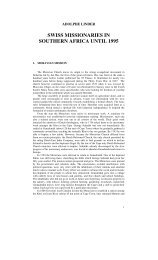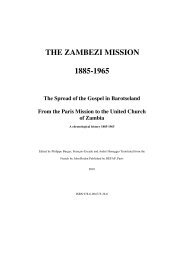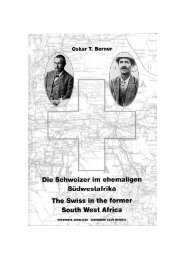THE SWISS IN SOUTHERN AFRICA 1652-1970 - swissroots-za.ch
THE SWISS IN SOUTHERN AFRICA 1652-1970 - swissroots-za.ch
THE SWISS IN SOUTHERN AFRICA 1652-1970 - swissroots-za.ch
Create successful ePaper yourself
Turn your PDF publications into a flip-book with our unique Google optimized e-Paper software.
7. Possibly a son, William, not baptised in Cape Town, served as Captain of Swiss<br />
troops stationed in Paris.<br />
<strong>THE</strong> TRAGIC STORY OF SUSANNA NICOLET<br />
When the Swiss Regiment Meuron arrived at the Cape in 1783, Colonel Gordon was<br />
Captain of the Garrison and Head of the Military Establishment. Count Meuron and his<br />
officers must have been delighted to find that his wfe Susanna was a compatriot.<br />
Gordon was of Scottish descent, his grandfather having settled in Holland where both<br />
he and his son, the father of Robert Jacob Gordon, served in the Scottish Brigade.<br />
Robert preferred a military career in the Dut<strong>ch</strong> army and in 1777 was sent out to the<br />
Cape as captain. He spent the first three years there exploring the Cape as far as the<br />
Orange and Great Fish Rivers. A keen observer with a university degree in the natural<br />
sciences, he made botanical and zoological collections and wrote copious notes on his<br />
experiences. These have been carefully preserved, but the letters he wrote to his<br />
betrothed, waiting in Europe to be called to his side, appear to have been lost; they<br />
might have told us how they met, whether during his visit to the Swiss Alps around<br />
1774 to study glaciers, or in Amsterdam where two of her sisters were married to Dut<strong>ch</strong><br />
businessmen.<br />
Three years after his arrival at the Cape, Gordon was appointed Commanding Officer.<br />
Now that he was to lead a more sedentary life and also do representative duties, he<br />
immediately made travel arrangements for Susanna and a personal maid and within nine<br />
days of her arrival here the marriage took place. In a period when all the principal<br />
people at the Cape entertained lavishly and most gave a ball every month, Susanna<br />
supported her husband most ably, besides bearing him six sons and a daughter. The<br />
Fren<strong>ch</strong> traveller Le Vaillant described her as being very kind hearted and beloved by all.<br />
The Gordons lived at S<strong>ch</strong>oongezi<strong>ch</strong>t in Oranjezi<strong>ch</strong>t 8 and later, with a view to early<br />
retirement, bought the farm Bouwers Kloof at the foot of the Paardeberg near<br />
Malmesbury. 9<br />
In 1789 France exploded in revolution and waves of unrest spread far and wide. In the<br />
Netherlands the governing Stadholder initially maintained his position with the aid of<br />
Prussian troops until the Fren<strong>ch</strong> revolutionary army overran his country and he fled to<br />
England. The British were eager to grant him asylum. Nine years earlier their attempt to<br />
capture the Cape had been foiled by the early arrival of a Fren<strong>ch</strong> fleet. Now they lost no<br />
time in obtaining a letter from the Stadholder directing the governor at the Cape to<br />
welcome the British as protectors. Although the British made sure no news rea<strong>ch</strong>ed the<br />
Cape of the accord rea<strong>ch</strong>ed by the Fren<strong>ch</strong> with the Dut<strong>ch</strong> people and their rejection of<br />
the Stadholder, the Company officials at the Cape remained distrustful of the British<br />
and kept them at arm’s length with never-ending negotiations.<br />
Gordon, on the other hand, as soldier loyal to the Stadholder, appears to have decided<br />
at an early stage to accept the Stadholder’s letter at face value. He deliberately neglected<br />
to strengthen the defences and during the British advance from Simon’s Town towards<br />
Cape Town withheld reinforcements from the defenders. The only time he is reported to<br />
have faced his troops with drawn sword to issue a command, was when they were<br />
assembled at the Castle and he ordered them to surrender their weapons to the British.<br />
The burgher militia cried treason and the people branded Gordon as a traitor. He was<br />
manhandled and came close to being killed. The British officers present made no move<br />
to save him and throughout the ceremony only the British flag was raised, never the<br />
Stadholder’s standard. Gordon came to realise that the British had misused the<br />
Stadholder’s letter to trick the defenders so as to gain the Cape for themselves. He saw<br />
his honour lost, his family exposed to ridicule and shame. He took his own life in the<br />
garden of S<strong>ch</strong>oongezi<strong>ch</strong>t.<br />
Susanna must have shared her husband’s agony as the seeds of doubt grew to<br />
certainty. Now suddenly her happy life at the Cape was shattered. With her <strong>ch</strong>ildren she<br />
returned to Switzerland. More sadness awaited her there. Her eldest son Robert serving<br />
under Napoleon at the defeat of Waterloo, suffered the fate whi<strong>ch</strong> so nearly overtook his<br />
father at the surrender: his men accused him of treason, maltreated and killed him. The<br />
91







